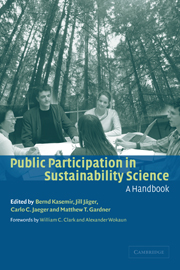Book contents
- Frontmatter
- Contents
- Notes on contributors
- Foreword: science, participation, and sustainability
- Foreword: sustainability, energy use, and public participation
- Preface
- Acknowledgments
- Part I Concepts and insights
- Part II Experiences with IA Focus Groups
- Part III Further forms of participation
- Part IV Future perspectives
- References
- Index
Foreword: sustainability, energy use, and public participation
Published online by Cambridge University Press: 22 September 2009
- Frontmatter
- Contents
- Notes on contributors
- Foreword: science, participation, and sustainability
- Foreword: sustainability, energy use, and public participation
- Preface
- Acknowledgments
- Part I Concepts and insights
- Part II Experiences with IA Focus Groups
- Part III Further forms of participation
- Part IV Future perspectives
- References
- Index
Summary
Sometimes I am astonished when taking a “sustainability” look at energy relevant news. The continued operation of smaller hydroelectric power plants, which are producing electricity with extremely low life-cycle carbon dioxide emissions, is questioned due to the availability of cheap electricity from fossil fuels. Heat insulation of buildings is progressing, yet the energy management of new buildings is considered clearly less important than aesthetic design and other factors. Small, light-weight fuel efficient vehicles are available on the market, yet the trend of current sales favors heavier and ever more powerful cars. Energy efficient appliances stay on the shelf as less efficient devices are offered at lower prices.
These facts show that ecologically favorable technical solutions are presently not being chosen, as sustainability arguments are not ranked high within the set of preferences of public and individual actors. This is why Public Participation in Sustainability Science, the subject of this book, is of utmost importance. Unless we succeed in engaging those stakeholders who ultimately decide on energy relevant investments and purchases better in sustainability debates, the market penetration of energy efficient or ecologically benign technology will be impeded or severely delayed. Such delays could have far-reaching consequences for our planet. Hence, it is necessary that not only Sustainability Policy but also Sustainability Science starts to involve the public in its discussions.
The approach of Integrated Assessment Focus Groups presented in this book combines two important aspects.
- Type
- Chapter
- Information
- Public Participation in Sustainability ScienceA Handbook, pp. xx - xxiiPublisher: Cambridge University PressPrint publication year: 2003

